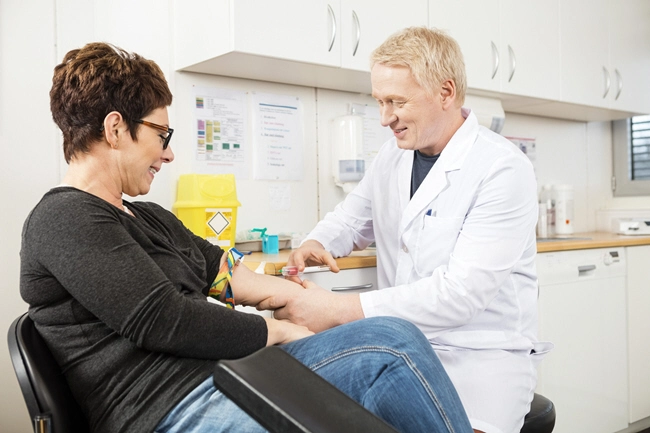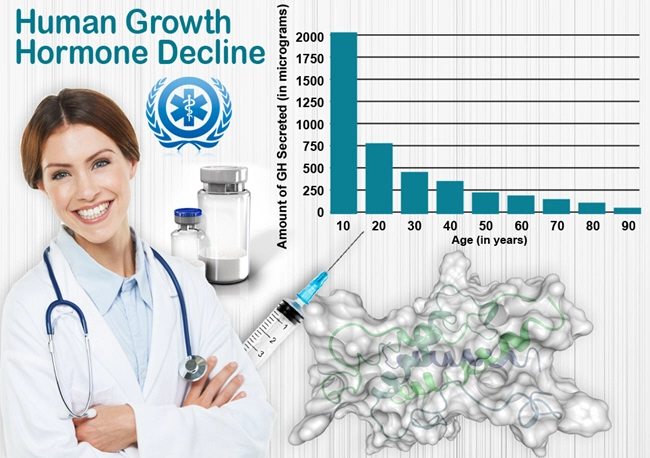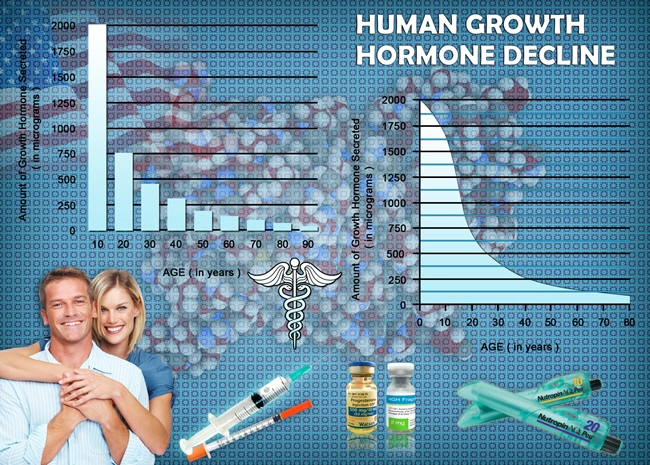
Video Link: https://vimeo.com/449824852
Video Download: Click Here To Download Video
Video Stream: Click Here To Stream Video
Human Growth Hormone (HGH, GH, Somatotropin) performs a broad range of critical functions in the body: the growth of muscles, bones, and crucial organs. Additionally, growth hormone is the key to regulating several hormonal pathways.
 Growth hormone also keeps our metabolisms running at a high pace, which helps to burn fat and boost our energy levels. When we add up all of the vital roles growth hormone plays in maintaining our good health, it is easy to see its importance in battling the aging process.
Growth hormone also keeps our metabolisms running at a high pace, which helps to burn fat and boost our energy levels. When we add up all of the vital roles growth hormone plays in maintaining our good health, it is easy to see its importance in battling the aging process.
The role of growth hormone is vast, to put it mildly.
And recent research has discovered another growth hormone benefit
Growth hormone plays a role in controlling blood sugar. Glucose is a simple sugar and maintaining glucose balance is essential in preventing and treating the diseases that result from either hypoglycemia (low blood sugar) or hyperglycemia (high blood sugar).
Glucagon and insulin are the two most significant regulators of blood sugar levels in the body. Growth hormone levels have been shown to influence the action of insulin-like-growth-factor 1 (IGF-1). Glucagon is a protein hormone that causes an increase in the sugar content of the blood by increasing the rate of glycogen break down in the liver.
Glycogen is defined as the main form of carbohydrate storage in animals and occurs primarily in the liver and muscle tissue. It converts to glucose as required by the body for energy.
Growth hormone mimics the effect of glucagon by counteracting insulin and lowering glucose levels in the body.
Growth Hormone Homeostasis
The vital takeaway is this: growth hormone levels in the body must be in homeostasis. Homeostasis is defined as a state of equilibrium, as in an organism or cell, maintained by a self-regulating process. In other words, growth hormone levels must be in balance. Too little can cause problems and so can too much.
In the past, studies have concluded that people who produce too much growth hormone may be at risk for developing diabetes. To further investigate this conclusion, a recent study looked in-depth at the two pathways that growth hormone affects glucose homeostasis: direct and indirect. Let’s take a look at what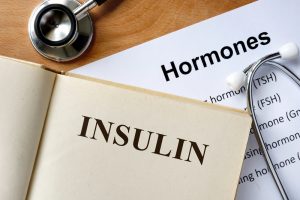 the research has concluded about each pathway.
the research has concluded about each pathway.
In the direct pathway, growth hormone acts similar to glucagon by starting a process called gluconeogenesis, which is the formation of glucose, especially by the liver, from non-carbohydrate sources, such as amino acids, and the glycerol portion of fats.
Researchers have concluded that people with high growth hormone levels have genes that exert a strong effect on gluconeogenesis. In fat tissue, growth hormone increases fatty acid synthesis, which may lead to insulin resistance.
Insulin resistance is a severe medical condition that lowers the ability of cells to react to the action of insulin in transferring glucose from the blood stream into muscle and other tissues. Insulin resistance is usually directly related to obesity and is a warning sign of the beginning of type 2 diabetes.
In other words, insulin is "knocking" on the door of muscle. The muscle hears the knock, opens the door, and lets the glucose enter. But insulin resistance does not allow the muscle to hear the knocking of the insulin (the muscle is "resistant").
The pancreas gland then makes more insulin, which increases insulin levels in the blood and causes a louder, incessant “pounding." Eventually, the pancreas pumps out way more insulin than is needed and the muscles continue to ignore the pounding by staying resistant.
If a person can produce enough insulin to get over this resistance, blood glucose levels remain in a healthy range. Once the pancreas is exhausted, blood glucose rises, initially after meals, then later even in the fasting state.
This eventually may lead to type 2 diabetes.
However, to counter this, growth hormone in muscle cells produces triglycerides and causes an uptake of fatty acids, which reduces insulin sensitivity. This decreased insulin sensitivity is theorized to be a direct effect of growth hormone on glucose performance, although this has not been confirmed in human trials.
Growth hormone indirectly affects blood sugar levels by regulation of IGF-1, which acts similarly to insulin in the body. Studies have demonstrated that IGF-1 can cause glucose uptake from the blood stream in an attempt to lower glucose levels.
Low Growth Hormone and Glycemic control in adults
Low growth hormone levels occur when the pancreas gland is not producing growth hormones in sufficient qualities to meet the body’s rebuilding and maintenance requirements. Low levels of growth hormone are usually connected to low levels of IGF-1, and this combination wreaks havoc on the body’s crucial metabolic highways.
The improvements in blood sugar levels in people receiving growth hormone replacement therapy are thought to be a result of the development of cells that do not respond to insulin. Growth hormone has been shown to reduce body fat and strengthen muscles, which lowers blood sugar.
While promising, larger studies are needed to confirm this observation.
The importance of maintaining growth hormone homeostasis
Getting the right balance of growth hormone is critical. As previously discussed, too little growth hormone in the body can result in a wide array of health problems: weight gain, loss of strength, osteoporosis, fatigue, brain fog, joint aches, insomnia, and a host of other issues.
But excess growth hormones can be a problem as well. Growth hormone replacement therapy is not something to attempt on your own.
And that is where our clinic can help
Our trained and experienced staff of medical professionals will guide your growth hormone replacement therapy every step of the way. We will begin with a 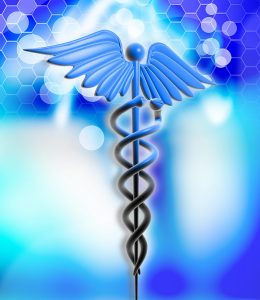 detailed evaluation of your present condition, develop a treatment regimen, and closely monitor your therapy.
detailed evaluation of your present condition, develop a treatment regimen, and closely monitor your therapy.
There are several proven benefits of growth hormone, and it appears that battling diabetes is yet another reason to begin experiencing what growth hormone can do for you!
Contact us for a FREE, No-Obligation discussion concerning human growth hormone replacement therapy.
Contact Us Today For A Free Consultation
Dear Patient,
Once you have completing the above contact form, for security purposes and confirmation, please confirm your information by calling us.
Please call now: 1-800-380-5339.
Welcoming You To Our Clinic, Professor Tom Henderson.

- Our HGH Clinic And Web Site Privacy Policy [Last Updated On: May 23rd, 2019] [Originally Added On: December 14th, 2017]
- Idaho HGH Clinics [Last Updated On: August 26th, 2025] [Originally Added On: March 19th, 2018]
- Injectable HGH Prescriptions In Cheyenne, Wyoming [Last Updated On: April 15th, 2025] [Originally Added On: March 3rd, 2019]
- Injectable HGH Prescriptions In Milwaukee, Wisconsin [Last Updated On: April 19th, 2025] [Originally Added On: March 3rd, 2019]
- Injectable HGH Prescriptions In Madison, Wisconsin [Last Updated On: April 1st, 2025] [Originally Added On: March 3rd, 2019]
- Injectable HGH Prescriptions In Green Bay, Wisconsin [Last Updated On: March 22nd, 2025] [Originally Added On: March 3rd, 2019]
- Injectable HGH Prescriptions In Charleston, West Virginia [Last Updated On: May 17th, 2025] [Originally Added On: March 3rd, 2019]
- Injectable HGH Prescriptions In Vancouver, Washington [Last Updated On: February 18th, 2025] [Originally Added On: March 3rd, 2019]
- Injectable HGH Prescriptions In Tacoma, Washington [Last Updated On: January 16th, 2025] [Originally Added On: March 3rd, 2019]
- Injectable HGH Prescriptions In Spokane, Washington [Last Updated On: April 16th, 2025] [Originally Added On: March 3rd, 2019]
- Injectable HGH Prescriptions In Seattle, Washington [Last Updated On: May 30th, 2025] [Originally Added On: March 3rd, 2019]
- Injectable HGH Prescriptions In Washington D.C [Last Updated On: January 15th, 2025] [Originally Added On: March 3rd, 2019]
- Injectable HGH Prescriptions In Bellevue, Washington [Last Updated On: June 1st, 2025] [Originally Added On: March 3rd, 2019]
- Injectable HGH Prescriptions In Virginia Beach, Virginia [Last Updated On: January 18th, 2025] [Originally Added On: March 3rd, 2019]
- Injectable HGH Prescriptions In Richmond, Virginia [Last Updated On: January 25th, 2025] [Originally Added On: March 3rd, 2019]
- Injectable HGH Prescriptions In Portsmouth, Virginia [Last Updated On: April 10th, 2025] [Originally Added On: March 3rd, 2019]
- Injectable HGH Prescriptions In Norfolk, Virginia [Last Updated On: May 28th, 2025] [Originally Added On: March 3rd, 2019]
- Injectable HGH Prescriptions In Newport News, Virginia [Last Updated On: April 12th, 2025] [Originally Added On: March 3rd, 2019]
- Injectable HGH Prescriptions In Hampton, Virginia [Last Updated On: January 11th, 2025] [Originally Added On: March 3rd, 2019]
- Injectable HGH Prescriptions In Chesapeake, Virginia [Last Updated On: January 9th, 2025] [Originally Added On: March 3rd, 2019]
- Injectable HGH Prescriptions In Arlington, Virginia [Last Updated On: February 6th, 2025] [Originally Added On: March 3rd, 2019]
- Injectable HGH Prescriptions In Alexandria, Virginia [Last Updated On: May 24th, 2025] [Originally Added On: March 3rd, 2019]
- Injectable HGH Prescriptions In Montpelier, Vermont [Last Updated On: April 29th, 2025] [Originally Added On: March 3rd, 2019]
- Injectable HGH Prescriptions In West Valley City, Utah [Last Updated On: April 16th, 2025] [Originally Added On: March 3rd, 2019]
- Injectable HGH Prescriptions In West Jordan, Utah [Last Updated On: March 15th, 2025] [Originally Added On: March 3rd, 2019]
- Injectable HGH Prescriptions In Salt Lake City, Utah [Last Updated On: January 28th, 2025] [Originally Added On: March 3rd, 2019]
- Injectable HGH Prescriptions In Provo, Utah [Last Updated On: May 12th, 2025] [Originally Added On: March 3rd, 2019]
- Injectable HGH Prescriptions In Wichita Falls, Texas [Last Updated On: April 1st, 2025] [Originally Added On: March 3rd, 2019]
- Injectable HGH Prescriptions In Waco, Texas [Last Updated On: March 15th, 2025] [Originally Added On: March 3rd, 2019]
- Injectable HGH Prescriptions In San Antonio, Texas [Last Updated On: February 4th, 2025] [Originally Added On: March 3rd, 2019]
- Injectable HGH Prescriptions In Round Rock, Texas [Last Updated On: December 29th, 2024] [Originally Added On: March 3rd, 2019]
- Injectable HGH Prescriptions In Richardson, Texas [Last Updated On: March 10th, 2025] [Originally Added On: March 3rd, 2019]
- Injectable HGH Prescriptions In Plano, Texas [Last Updated On: February 6th, 2025] [Originally Added On: March 3rd, 2019]
- Injectable HGH Prescriptions In Pasadena, Texas [Last Updated On: March 31st, 2025] [Originally Added On: March 3rd, 2019]
- Injectable HGH Prescriptions In Midland, Texas [Last Updated On: April 23rd, 2025] [Originally Added On: March 3rd, 2019]
- Injectable HGH Prescriptions In Mesquite, Texas [Last Updated On: April 9th, 2025] [Originally Added On: March 3rd, 2019]
- Injectable HGH Prescriptions In McKinney, Texas [Last Updated On: May 19th, 2025] [Originally Added On: March 3rd, 2019]
- Injectable HGH Prescriptions In McAllen, Texas [Last Updated On: April 3rd, 2025] [Originally Added On: March 3rd, 2019]
- Injectable HGH Prescriptions In Lubbock, Texas [Last Updated On: May 10th, 2025] [Originally Added On: March 3rd, 2019]
- Injectable HGH Prescriptions In Lewisville, Texas [Last Updated On: January 29th, 2025] [Originally Added On: March 3rd, 2019]
- Injectable HGH Prescriptions In Laredo, Texas [Last Updated On: April 26th, 2025] [Originally Added On: March 3rd, 2019]
- Injectable HGH Prescriptions In Killeen, Texas [Last Updated On: March 4th, 2025] [Originally Added On: March 3rd, 2019]
- Injectable HGH Prescriptions In Irving, Texas [Last Updated On: February 9th, 2025] [Originally Added On: March 3rd, 2019]
- Injectable HGH Prescriptions In Houston, Texas [Last Updated On: April 6th, 2025] [Originally Added On: March 3rd, 2019]
- Injectable HGH Prescriptions In Grand Prairie, Texas [Last Updated On: January 17th, 2025] [Originally Added On: March 3rd, 2019]
- Injectable HGH Prescriptions In Garland, Texas [Last Updated On: February 14th, 2025] [Originally Added On: March 3rd, 2019]
- Injectable HGH Prescriptions In Fort Worth, Texas [Last Updated On: April 21st, 2025] [Originally Added On: March 3rd, 2019]
- Injectable HGH Prescriptions In El Paso, Texas [Last Updated On: February 28th, 2025] [Originally Added On: March 3rd, 2019]
- Injectable HGH Prescriptions In Denton, Texas [Last Updated On: May 6th, 2025] [Originally Added On: March 3rd, 2019]
- Injectable HGH Prescriptions In Dallas, Texas [Last Updated On: December 31st, 2024] [Originally Added On: March 3rd, 2019]
- Injectable HGH Prescriptions In Corpus Christi, Texas [Last Updated On: June 7th, 2025] [Originally Added On: March 3rd, 2019]
- Injectable HGH Prescriptions In Carrollton, Texas [Last Updated On: June 3rd, 2025] [Originally Added On: March 3rd, 2019]
- Injectable HGH Prescriptions In Brownsville, Texas [Last Updated On: February 4th, 2025] [Originally Added On: March 3rd, 2019]
- Injectable HGH Prescriptions In Beaumont, Texas [Last Updated On: April 4th, 2025] [Originally Added On: March 3rd, 2019]
- Injectable HGH Prescriptions In Austin, Texas [Last Updated On: June 5th, 2025] [Originally Added On: March 3rd, 2019]
- Injectable HGH Prescriptions In Arlington, Texas [Last Updated On: January 13th, 2025] [Originally Added On: March 3rd, 2019]
- Injectable HGH Prescriptions In Amarillo, Texas [Last Updated On: March 18th, 2025] [Originally Added On: March 3rd, 2019]
- Injectable HGH Prescriptions In Abilene, Texas [Last Updated On: January 5th, 2025] [Originally Added On: March 3rd, 2019]
- Injectable HGH Prescriptions In Nashville, Tennessee [Last Updated On: March 2nd, 2025] [Originally Added On: March 3rd, 2019]
- Injectable HGH Prescriptions In Murfreesboro, Tennessee [Last Updated On: March 8th, 2025] [Originally Added On: March 3rd, 2019]
- Injectable HGH Prescriptions In Memphis, Tennessee [Last Updated On: March 28th, 2025] [Originally Added On: March 3rd, 2019]
- Injectable HGH Prescriptions In Knoxville, Tennessee [Last Updated On: March 25th, 2025] [Originally Added On: March 3rd, 2019]
- Injectable HGH Prescriptions In Clarksville, Tennessee [Last Updated On: February 2nd, 2025] [Originally Added On: March 3rd, 2019]
- Injectable HGH Prescriptions In Chattanooga, Tennessee [Last Updated On: January 29th, 2025] [Originally Added On: March 3rd, 2019]
- Injectable HGH Prescriptions In Sioux Falls, South Dakota [Last Updated On: December 25th, 2024] [Originally Added On: March 3rd, 2019]
- Injectable HGH Prescriptions In Columbia, South Carolina [Last Updated On: February 2nd, 2025] [Originally Added On: March 3rd, 2019]
- Injectable HGH Prescriptions In Charleston, South Carolina [Last Updated On: January 31st, 2025] [Originally Added On: March 3rd, 2019]
- Injectable HGH Prescriptions In Providence, Rhode Island [Last Updated On: January 30th, 2025] [Originally Added On: March 3rd, 2019]
- Injectable HGH Prescriptions In Pittsburgh, Pennsylvania [Last Updated On: May 18th, 2025] [Originally Added On: March 3rd, 2019]
- Injectable HGH Prescriptions In Erie, Pennsylvania [Last Updated On: January 4th, 2025] [Originally Added On: March 3rd, 2019]
- Injectable HGH Prescriptions In Allentown, Pennsylvania [Last Updated On: May 6th, 2025] [Originally Added On: March 3rd, 2019]
- Injectable HGH Prescriptions In Salem, Oregon [Last Updated On: January 31st, 2025] [Originally Added On: March 3rd, 2019]
- Injectable HGH Prescriptions In Portland, Oregon [Last Updated On: February 1st, 2025] [Originally Added On: March 3rd, 2019]
- Injectable HGH Prescriptions In Gresham, Oregon [Last Updated On: January 30th, 2025] [Originally Added On: March 3rd, 2019]
- Injectable HGH Prescriptions In Eugene, Oregon [Last Updated On: January 27th, 2025] [Originally Added On: March 3rd, 2019]
- Injectable HGH Prescriptions In Tulsa, Oklahoma [Last Updated On: May 26th, 2025] [Originally Added On: March 3rd, 2019]
- Injectable HGH Prescriptions In Oklahoma City, Oklahoma [Last Updated On: February 22nd, 2025] [Originally Added On: March 3rd, 2019]
- Injectable HGH Prescriptions In Norman, Oklahoma [Last Updated On: April 28th, 2025] [Originally Added On: March 3rd, 2019]
- Injectable HGH Prescriptions In Toledo, Ohio [Last Updated On: April 14th, 2025] [Originally Added On: March 3rd, 2019]
- Injectable HGH Prescriptions In Dayton, Ohio [Last Updated On: April 11th, 2025] [Originally Added On: March 3rd, 2019]
